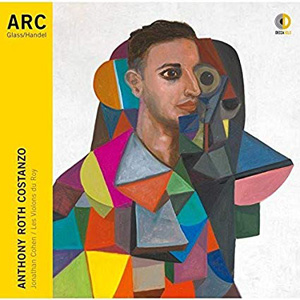This is a fine idea, beautifully executed. The similarities between Baroque music and minimalism may be somewhat shallow, but they’re valid: repetition, variations slight and less-slight, written and improvised, and a type of ritualism that keeps the listener involved. Still-young, glorious-voiced countertenor Anthony Roth Costanzo has a quickening intellect, and both Handel and, lately, Philip Glass, are playing a major role in his repertoire.
Costanzo has a remarkable control over dynamics, more-so than most countertenors, and this makes him a more dramatic, in-your-face singer than others. Listening to the soft, sweet, “Lascia ch’io pianga”, the words sewn together with an impeccable legato, one is touched by sadness. A similar effect, though with a somewhat heavier tread, is audible in Tolomeo’s “Stille amare”, a mood piece sung by a character who believes he has been poisoned. He feels his life ebbing away, poison drop by poison drop. It’s riveting story-telling and glorious Handel singing with long lines, little embellishments, and a pure tone and unbroken line.
But the CD begins with a piece called “The Encounter”, from Glass’ 1000 Airplanes on the Roof, a 1988 mixed-media opera in which the sole character recalls alien encounters. In this number the wordless text is all wonder, with the underpinning of Glass’ busy-busy orchestra, wind-heavy, buoying up the singer’s straight-toned amazement: Costanzo uses a startled, almost harsh tone. The excerpt “Liquid Days”, one of six songs reflective of love, loss, nature, etc., is from an eponymous cycle Glass composed in 1986 with David Byrne. Love, sleep, urgency, peaceful entreaties are all given their proper weight. Gorgeous.
The vengeance aria “Vivi, tiranno” from Rodelinda is delivered with passion and rage. Cascades of perfectly placed notes, flawless diction (not always the case in the Glass), trills, and endless breath turn this into the showpiece it ought to be. “How all living things breathe”, from Glass’ The Fall of the House of Usher, is a song to anthropomorphism. An intro of harp and bassoon gives way to sighing, sympathetic strings; the singer seems in a hypnotic state. The ubiquitous “Ombra mai fù” from Serse is sung with great reserve and poise; it leads to the CD’s final excerpt, “The Hymn to the Sun” from Glass’ Akhnaten, which will be heard next season at the Met. It’s magnificent. Anthony Roth Costanzo’s ability to use his voice purely instrumentally contrasts with his great communication of the text and feeling, and Les Violons du Roy, under Jonathan Cohen, accompanies sensitively and lovingly. An unusual, superb recital.
































